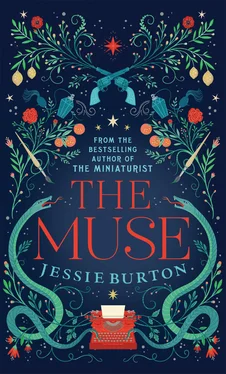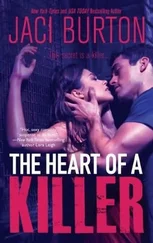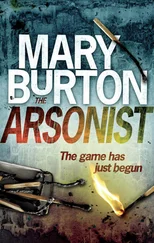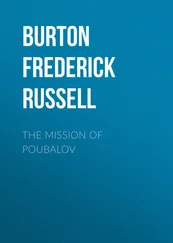Jorge and Gregorio came into her cell at eight o’clock in the morning, where she was sitting upright on the bed, every one of her vertebrae pressed up against the cold stone of the wall. ‘Up,’ said Jorge.
She stood, and he approached. ‘For the last time, Teresa. Where is your brother?’
‘I don’t kn—’
He whacked her round the mouth and her head flew back, cracking against the wall.
‘I said, where is he?’
Teresa began to scream, until Jorge punched her again and she heard Gregorio cry out before she fell unconscious. The next thing she knew, she was blindfolded, bumping up and down in the back of their truck again, the iron tang of blood and a loose tooth in her mouth.
She tried to turn her head to the open air to see if she could sense where they were going, but she was still disorientated. Her neck hurt, her skull throbbed. The blindfold had been tied so tight that it cut across her eye sockets. It smelled like sweat, someone else’s blood. Was this it? Deep in her heart, in her dreams she had feared this moment. She was going to be shot in the head, round the back of some hut, fifty kilometres away from her home. And who would miss her? Who would mourn her passing?
The truck stopped. Teresa heard the men jump out of the wagon and swing down the back flap of the truck.
‘Don’t shoot me. Don’t shoot me,’ she pleaded, hearing the crack of her own voice, surprised at this overwhelming passion to live, and how prepared she was to abase herself in order to do it. Anything, to live. ‘Gregorio,’ she said. ‘Please. Please. Save me.’
But Gregorio did not speak. A hand took her arm and walked her a few steps, pushing her down onto a chair. Teresa heard footsteps moving away, crunching against what sounded like gravel. She had been placed in the direction of the sun, and she could feel it warming her face, orange and gold through the blindfold and the tender skin of her eyelids. This is it , she thought.
‘Olive,’ she whispered, ‘Olive.’ She kept saying the name, and the blindfold was lifted. There was silence, then the sound of a few birds as they flapped across the sky. Teresa squinted, blinking to adjust her vision to the light. To her surprise, she saw Olive standing to her right, her head haloed in gold, the buildings behind her squares of white.
‘Am I dead?’ Teresa said.
‘No,’ replied a man.
Teresa could see now that she was in the main square, on a chair placed directly in front of the charred frame of the church. The villagers had started to gather — shrinking away like a shoal of fish as Teresa turned her head. She tried to rise from the chair towards Olive. Olive took a step towards her, her arm outstretched, but Gregorio pushed Teresa back down.
Jorge waved his pistol at the gathered villagers. ‘Keep back!’ he shouted, but Olive stayed forward.
‘What are you going to do to her?’ she shouted in Spanish. ‘What are you going to do?’
‘Shut up!’ Jorge said, going over to the truck and pulling something from the passenger seat. He walked back to Teresa, hands on his hips, assessing her, pacing round her slowly before taking her plait in his hand, weighing it like he was a widow at market, turning his nose up at the produce. With his other hand, he lifted up a large pair of shears, the kind gardeners used to prune their plants and flowers.
‘I’ll be fair,’ he said, his fist wrapped round the plait. ‘Let’s unravel it, bit by bit. I’m going to ask you one more time about your brother, and if you cooperate, you can keep your hair.’
Teresa had turned to stone, the only living thing her plait, coiled and twitching in Jorge’s fist. Her gaze was distant; her body was there, but she was not. As Jorge undid her hair with an air of industry, she didn’t flinch or cry out — she just sat, staring into nothingness. So still, so meditative, The Muse she looked almost complicit in the spectacle, until you noticed her bunched fists, the knuckles whitening through the skin.
‘Don’t do this,’ Olive said to the men. ‘She doesn’t know where he is.’
Jorge swung round to face the other girl. ‘That’s what she says.’
Snip went the shears, a long tendril of black hair falling to the ground, where it lay in the dust like a snake. No one whispered, no one even seemed to breathe. ‘Señorita,’ Gregorio said to Olive. ‘This is not your affair.’
‘Don’t hurt her,’ said Olive. ‘You’ll regret it. Does her father know you’re doing this—’
‘If you don’t shut up, you’ll be next,’ Jorge shouted, lifting the shears again. ‘Where’s your brother?’ he asked Teresa, and still Teresa did not speak. Jorge began to hack the second handful of hair.
Just say something, Tere , Olive thought. Anything, a lie. But Teresa was mute, keeping her eyes on the burned-out church, and Olive could almost feel the whisker-touch of dark hair falling against her own neck. Teresa still did not flinch, but Olive could see fear glimmering in her eye, buried within that blank look.
‘Where is he?’ came the question, again and again. And still, Teresa was silent, so Jorge cut more of her hair, close to the line of the skull, emerging as a clumpy, patchy thing. ‘You’re a furry mushroom,’ Jorge said, laughing. No one in the village joined him, but neither did they move to stop this spectacle.
‘Teresa,’ Olive called. ‘I’m here.’
‘For all the good you’ve done her,’ said Gregorio.
Once the bulk of Teresa’s hair was gone, Jorge produced a barbering razor from his pocket. ‘What are you doing?’ hissed Gregorio. ‘She got the message.’
‘I don’t think so,’ said Jorge, placing the blade on the top of Teresa’s head. He began to shave the remaining patchy tufts until she was completely bald, the ancient humiliation, back to the Bible days, the days of blood.
‘This is what happens,’ said Jorge, holding the razor aloft, ‘when you conceal information about a wanted criminal and fail to cooperate with the law.’
‘The law?’ said Olive.
The villagers remained immobile. Teresa’s skull was covered with weeping nicks where he’d cut into her skin. Jorge pulled Teresa up out of the chair, and she moved with him like a puppet.
‘Now take off your skirt and blouse,’ he said.
‘Stop!’ shouted another woman next to Olive, and Jorge stalked towards her.
‘You next, Rosita?’ he said. ‘You want to look like a mushroom too? Because I promise you can be next.’ Rosita shrank away, shaking her head, fear distorting her face.
Slowly, Teresa peeled off her skirt and blouse, revealing her skinny legs, her underwear. Olive wanted to seize her, but she worried that darting forward and grabbing Teresa might now make things worse for her. Jorge seemed so pumped up, and even though Gregorio was less sure of himself, he could be equally dangerous.
From the truck, Gregorio fetched a smock-like dress that looked like it had been sewn in the sixteenth century, and a bottle, the contents of which Olive couldn’t work out. He put the smock over Teresa’s head, and helped her elbows and hands through the heavy sleeves. ‘Take off your shoes, Teresa,’ he said, like a parent to a child, and when Teresa obeyed him, it was absurdly painful.
Teresa’s fingers fumbled over the knot in her shoelaces. Gregorio grew impatient and sliced them in two with his flick-knife. And it seemed to be this — more than the shaving, more than the stripping — that finally unleashed Teresa’s rage. Her one pair of shoes, so neatly polished despite their age, were now unbound flaps of leather lying in the dust. She cried out and fell down.
‘Get up!’ Jorge screamed, but she didn’t move. Jorge thrust the bottle at her. ‘This is what we do to traitors,’ he said.
Читать дальше












